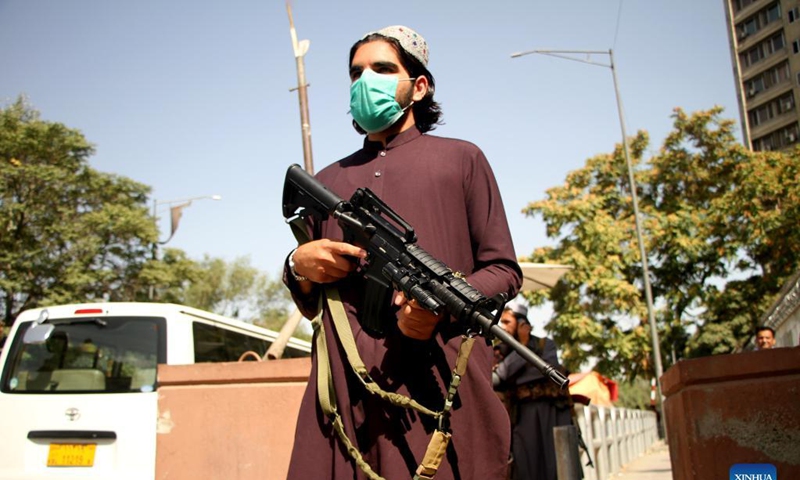-

- Liu Zongyi
- Associate Research Fellow
- Center for Asia-Pacific Studies
- Institute for International Strategic Studies
- A ‘China hand’ from India bears high hopes amid the current stalemate
- India rebalances between US, Russia, but China strategy remains unchanged
- ISRO-OPPO deal benefits India; less hostility is needed
- US efforts to isolate China from solar industry to end in futility
- Time for New Delhi to reconsider its anti-China economic policy

A Taliban fighter stands in Kabul, capital of Afghanistan, Aug. 28, 2021.Photo: Xinhua
Over the past two decades, India has invested heavily in Afghanistan with an accumulated investment totaling $3 billion.
India has been so active as an investor in Afghanistan that it reportedly ranked No.1 among all developing countries.
In contrast, data from the Chinese Embassy to Afghanistan showed that China only has $630 million in accumulated non-financial direct investment in the country as of the end of 2020.
India entered the Afghan game with the geopolitical aim of containing the development of Pakistan. Over the past two decades, Indian investment was shielded by the US military might in the country. Now that the US has pulled its troops out of Afghanistan, the degree of apprehension in New Dehli about India's investment becoming a sunken capital has begun to rise.
A large portion of India's investment had gone into establishing soft power in Afghanistan. Many Indian elites tried to console themselves that unlike concrete projects such as hydropower projects and roads, the investment in establishing soft power such as training Afghans is less likely to immediately suffer from the sudden loss of the US military protection.
Nevertheless, India's obsession with the regional game of "snakes and ladders" has added great uncertainty to its economic projects in Afghanistan.
Now that the US has pulled its troops out of Afghanistan, in a way that nobody would describe as morale boosting to its allies and partners, India suddenly found itself in a dilemma of its own making and having to bear a sudden geopolitical risk on its investment in Afghanistan from the US' pullout.
India's treatment of economic cooperation projects as a tool for geopolitics, rather than a genuine regional cooperation, is also in part to blame for the debacle it faces now in Afghanistan.
As an Indian envoy in Doha met a leader of Taliban in what is the first official diplomatic meeting this week, the Taliban has called for India to continue its political and trade ties with Afghanistan. Perhaps India needs to rethink its Afghan strategy.
Source of documents:Global Times, Sep 2, 2021
